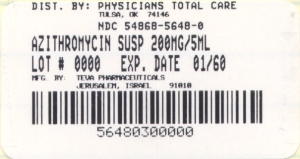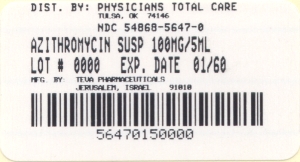Do you know that important immune protective proteins are present in breast milk? Breast milk also contains required vitamins, minerals, saturated and un saturated fats. These things are extremely important for development of healthy brain. If you are taking any medicine for short term or for the chronic reason then that passes in breast milk as well, that is why you should always check the drug with your health care provider. Here at DrLact we try to analyze drugs based on available researches and in this sheet we will present our analysis for Azithromycin Monohydrate Powder, For Suspension.
What is Azithromycin Monohydrate Powder, For Suspension used for?
Azithromycin is indicated for the treatment of patients with mild to moderate infections (pneumonia: see WARNINGS ) caused by susceptible strains of the designated microorganisms in the specific conditions listed below. As recommended dosages, durations of therapy and applicable patient populations vary among these infections, please see DOSAGE AND ADMINISTRATION for specific dosing recommendations. Adults Acute bacterial exacerbations of chronic obstructive pulmonary disease due to Haemophilus influenzae, Moraxella catarrhalis or Streptococcus pneumoniae. Acute bacterial sinusitis due to Haemophilus influenzae, Moraxella catarrhalis or Streptococcus pneumoniae. Community-acquired pneumonia due to Chlamydia pneumoniae, Haemophilus influenzae, Mycoplasma pneumoniae or Streptococcus pneumoniae in patients appropriate for oral therapy. NOTE: Azithromycin should not be used in patients with pneumonia who are judged to be inappropriate for oral therapy because of moderate to severe illness or risk factors such as any of the following: patients with cystic fibrosis, patients with nosocomially acquired infections, patients with known or suspected bacteremia, patients requiring hospitalization, elderly or debilitated patients, or patients with significant underlying health problems that may compromise their ability to respond to their illness (including immunodeficiency or functional asplenia). Pharyngitis/tonsillitis caused by Streptococcus pyogenes as an alternative to first-line therapy in individuals who cannot use first-line therapy. NOTE: Penicillin by the intramuscular route is the usual drug of choice in the treatment of Streptococcus pyogenes infection and the prophylaxis of rheumatic fever. Azithromycin is often effective in the eradication of susceptible strains of Streptococcus pyogenes from the nasopharynx. Because some strains are resistant to azithromycin, susceptibility tests should be performed when patients are treated with azithromycin. Data establishing efficacy of azithromycin in subsequent prevention of rheumatic fever are not available. Uncomplicated skin and skin structure infections due to Staphylococcus aureus, Streptococcus pyogenes, or Streptococcus agalactiae. Abscesses usually require surgical drainage. Urethritis and cervicitis due to Chlamydia trachomatis or Neisseria gonorrhoeae. Genital ulcer disease in men due to Haemophilus ducreyi (chancroid). Due to the small number of women included in clinical trials, the efficacy of azithromycin in the treatment of chancroid in women has not been established. Azithromycin, at the recommended dose, should not be relied upon to treat syphilis. Antimicrobial agents used in high doses for short periods of time to treat non-gonococcal urethritis may mask or delay the symptoms of incubating syphilis. All patients with sexually-transmitted urethritis or cervicitis should have a serologic test for syphilis and appropriate cultures for gonorrhea performed at the time of diagnosis. Appropriate antimicrobial therapy and follow-up tests for these diseases should be initiated if infection is confirmed. Appropriate culture and susceptibility tests should be performed before treatment to determine the causative organism and its susceptibility to azithromycin. Therapy with azithromycin may be initiated before results of these tests are known; once the results become available, antimicrobial therapy should be adjusted accordingly. To reduce the development of drug-resistant bacteria and maintain the effectiveness of azithromycin and other antibacterial drugs, azithromycin should be used only to treat or prevent infections that are proven or strongly suspected to be caused by susceptible bacteria. When culture and susceptibility information are available, they should be considered in selecting or modifying antibacterial therapy. In the absence of such data, local epidemiology and susceptibility patterns may contribute to the empiric selection of therapy. Pediatric Patients(See PRECAUTIONS—Pediatric Use and CLINICAL STUDIES IN PEDIATRIC PATIENTS .) Acute otitis media caused by Haemophilus influenzae, Moraxella catarrhalis or Streptococcus pneumoniae. (For specific dosage recommendation, see DOSAGE AND ADMINISTRATION .) Community-acquired pneumonia due to Chlamydia pneumoniae, Haemophilus influenzae, Mycoplasma pneumoniae or Streptococcus pneumoniae in patients appropriate for oral therapy. (For specific dosage recommendation, see DOSAGE AND ADMINISTRATION .) NOTE: Azithromycin should not be used in pediatric patients with pneumonia who are judged to be inappropriate for oral therapy because of moderate to severe illness or risk factors such as any of the following: patients with cystic fibrosis, patients with nosocomially acquired infections, patients with known or suspected bacteremia, patients requiring hospitalization, or patients with significant underlying health problems that may compromise their ability to respond to their illness (including immunodeficiency or functional asplenia). Pharyngitis/tonsillitis caused by Streptococcus pyogenes as an alternative to first-line therapy in individuals who cannot use first-line therapy. (For specific dosage recommendation, see DOSAGE AND ADMINISTRATION .) NOTE: Penicillin by the intramuscular route is the usual drug of choice in the treatment of Streptococcus pyogenes infection and the prophylaxis of rheumatic fever. Azithromycin is often effective in the eradication of susceptible strains of Streptococcus pyogenes from the nasopharynx. Because some strains are resistant to azithromycin, susceptibility tests should be performed when patients are treated with azithromycin. Data establishing efficacy of azithromycin in subsequent prevention of rheumatic fever are not available. Appropriate culture and susceptibility tests should be performed before treatment to determine the causative organism and its susceptibility to azithromycin. Therapy with azithromycin may be initiated before results of these tests are known; once the results become available, antimicrobial therapy should be adjusted accordingly.
Is using Azithromycin Monohydrate Powder, For Suspension unsafe in breastfeeding? Can there be bad consequences for baby if I use it while breastfeeding?
Active ingredient in Azithromycin Monohydrate Powder, For Suspension is Azithromycin and based on our analysis of Azithromycin it appears that using Azithromycin Monohydrate Powder, For Suspension is safe in breastfeeding. Below is analysis of Azithromycin while breastfeeding.
Azithromycin Monohydrate Powder, For Suspension Breastfeeding Analsys
SafeCAS Number: 83905-01-5
Excreted in very low levels into breast milk and commonly used for pediatric treatment. Early exposition to Macrolides (mostly Erythromycin) have been related to hypertrophic pyloric stenosis. Avoiding use in the first post-partum month would be advisable yet it may occurred while breastfeeding. Be aware of false negative bacterial cultures in the infant when the mother is on antibiotics. Also, diarrheal disease due to imbalance of intestinal flora is possible.
Azithromycin Monohydrate Powder, For Suspension Breastfeeding Analsys - 2
CAS Number: 83905-01-5
Because of the low levels of azithromycin in breastmilk and use in infants in higher doses, it would not be expected to cause adverse effects in breastfed infants. Monitor the infant for possible effects on the gastrointestinal flora, such as diarrhea, candidiasis (thrush, diaper rash). Unconfirmed epidemiologic evidence indicates that the risk of hypertrophic pyloric stenosis in infants might be increased by maternal use of macrolide antibiotics during breastfeeding. A single dose of azithromycin given during labor to women who were nasal carriers of pathogenic and reduced the counts of these bacteria in breastmilk in one study.

I already used Azithromycin Monohydrate Powder, For Suspension and meanwhile I breastfed my baby should I be concerned?
It is always a good idea to keep your healthcare provider or doctor informed about your drug usage during pregnancy and breastfeeding but if you have not informed your doctor about Azithromycin Monohydrate Powder, For Suspension and have used it then do not panic as Azithromycin Monohydrate Powder, For Suspension is mostly safe in breastfeeding and should not cause any harm to your baby.
My health care provider has asked me to use Azithromycin Monohydrate Powder, For Suspension, what to do?
Usage of Azithromycin Monohydrate Powder, For Suspension is safe for nursing mothers and baby, No worries.
If I am using Azithromycin Monohydrate Powder, For Suspension, will my baby need extra monitoring?
No
Who can I talk to if I have questions about usage of Azithromycin Monohydrate Powder, For Suspension in breastfeeding?
US
National Womens Health and Breastfeeding Helpline: 800-994-9662 (TDD 888-220-5446) 9 a.m. and 6 p.m. ET, Monday through Friday
UK
National Breastfeeding Helpline: 0300-100-0212 9.30am to 9.30pm, daily
Association of Breastfeeding Mothers: 0300-330-5453
La Leche League: 0345-120-2918
The Breastfeeding Network supporter line in Bengali and Sylheti: 0300-456-2421
National Childbirth Trust (NCT): 0300-330-0700
Australia
National Breastfeeding Helpline: 1800-686-268 24 hours a day, 7 days a week
Canada
Telehealth Ontario for breastfeeding: 1-866-797-0000 24 hours a day, 7 days a week



